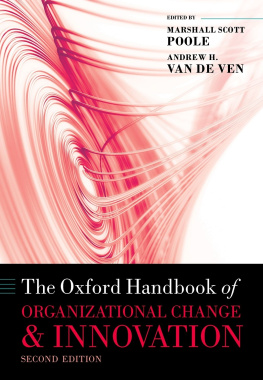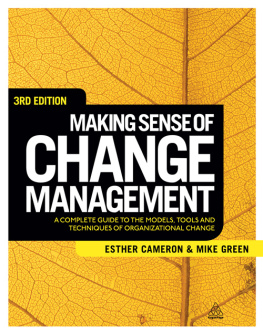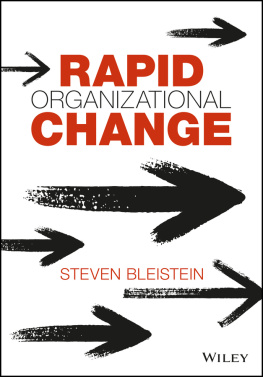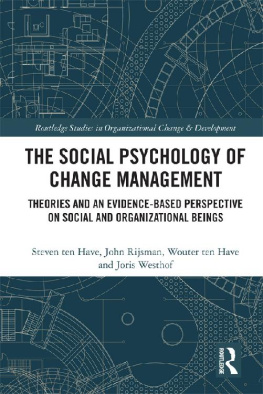Management Scholarship and Organisational Change
Change is a crucial and inescapable process for many organisations. It remains a constant challenge for managers and many change management initiatives fail. Burns and Stalkers seminal text on managing change, The Management of Innovation, has often been used as a basis for research in mainstream management journals and has been represented as an important theory in popular and long-established management textbooks. The issues raised in that book are still being grappled with by academics and practitioners today.
Miriam Green provides a critical analysis of the mainstream construction of knowledge on change management through an examination of representations of that text. The main thesis of her book is that this literature, though valuable, does not provide a full picture. Its objectivist approach ignores the role of other factors raised in the original study. These factors include the effects of power, politics, resistance and employee influence on the outcomes of managerial change strategies and on other organisational processes, with important consequences for the understanding of change initiatives by both academics and practitioners. This is part of an ongoing debate in management studies and more widely in the social sciences about theoretical approaches and research methods.
The originality of this book lies in its in-depth comparison of an entire monograph on organisations facing technological and commercial change, with an equally in-depth analysis of the ways this work has been represented and used as a basis for teaching and research. It highlights the limitations of the exclusive use of one approach to explain the complications arising from organisational change. It challenges the scientific justification offered for that approach and supports arguments for more inclusive and sustainable scholarship, of greater relevance to academics, managers and other organisational stakeholders.
Miriam Green was for many years a Senior Lecturer at London Metropolitan University and is currently teaching at Icon College of Technology and Management. She completed a PhD in Organisation Studies, on which this book is based, and has also written journal articles and book chapters in this field. Her current research interests include critiques of neo-liberalism and postmodernism.
Finance, Governance and Sustainability: Challenges to Theory and Practice Series
Series Editor :
Professor Gler Aras, Yildiz Technical University, Turkey;
Georgetown University, Washington DC, USA
Focusing on the studies of academicians, researchers, entrepreneurs, policy makers and government officers, this international series aims to contribute to the progress in matters of finance, good governance and sustainability. These multidisciplinary books combine strong conceptual analysis with a wide range of empirical data and a wealth of case materials. They will be of interest to those working in a multitude of fields, across finance, governance, corporate behaviour, regulations, ethics and sustainability.
Cosmopolitan Business Ethics
Towards a Global Ethos of Management
Jacob Dahl Rendtorff
Sustainability Accounting and Integrated Reporting
Edited by Charl de Villiers and Warren Maroun
Women on Corporate Boards
An International Perspective
Edited by Maria Aluchna and Gler Aras
Stakeholder Engagement and Sustainability Reporting
Marco Bellucci and Giacomo Manetti
Management Scholarship and Organisational Change
Representing Burns and Stalker
Miriam Green
For more information about this series, please visit www.routledge.com/Finance-Governance-and-Sustainability/book-series/FINGOVSUST
First published 2019
by Routledge
2 Park Square, Milton Park, Abingdon, Oxon OX14 4RN
and by Routledge
52 Vanderbilt Avenue, New York, NY 10017
Routledge is an imprint of the Taylor & Francis Group, an Informa business
2019 Miriam Green
The right of Miriam Green to be identified as author of this work has been asserted by her in accordance with sections 77 and 78 of the Copyright, Designs and Patents Act 1988.
All rights reserved. No part of this book may be reprinted or reproduced or utilised in any form or by any electronic, mechanical, or other means, now known or hereafter invented, including photocopying and recording, or in any information storage or retrieval system, without permission in writing from the publishers.
Trademark notice: Product or corporate names may be trademarks or registered trademarks, and are used only for identification and explanation without intent to infringe.
British Library Cataloguing-in-Publication Data
A catalogue record for this book is available from the British Library
Library of Congress Cataloging-in-Publication Data
Names: Green, Miriam, author.
Title: Management scholarship and organisational change : representing Burns and Stalker / Miriam Green.
Description: Abingdon, Oxon ; NewYork, NY : Routledge, 2019. | Series: Finance, governance and sustainability: challenges to theory and practice series
Subjects: LCSH: Organizational changeStudy and teaching (Higher) | ManagementStudy and teaching (Higher) | Burns, Tom, 1913- Management of innovation.
Classification: LCC HD58.8 .G7243 2019 | DDC 658.4/063dc23
LC record available at https://lccn.loc.gov/2018041736
ISBN: 978-1-138-69838-3 (hbk)
ISBN: 978-1-315-51929-6 (ebk)
To Vic, Liz, Cat, Simon and Ben
It is a sad fact that as we age we have a tendency to forget things and as time passes our memories of things can tend to become distorted. It is for this reason that we have a tendency to excuse ourselves for memory lapses and blame it on old age a reason, or excuse, which is accepted by everyone. In actual fact events happen and their memories are built into our memory through integration with those memories which are already there. It is for this reason that we can all have different memories of the same event which we all experienced, as our previous experiences and memories cause differing parts of the common experience to be highlighted and integrated with our existing memories. Of course there is also the existence of false memories which are about the recollection of events which have never actually happened. Each one of us has experienced all of these as it is just a part of everyday life which we must accept.
In a separate context, we are all familiar with the arguments of Roland Barthes in his Death of the Author paper of 1967 that the reputation of the author is irrelevant to what is being argued. In a similar vein Derrida has argued that once something has been written, the intentions of the author become irrelevant and it is only the interpretations extracted by the reader which have any importance. And similarly we have all had the experience of something which we have said or written being misinterpreted by the listener or reader. Or rather they have interpreted our words within their own context and experiences.
Bearing all this in mind it is perhaps surprising that we ever agree upon anything, but it is generally accepted that we share a common body of knowledge and understanding. Indeed social life would be very difficult without this. Indeed life would be virtually impossible without this shared understanding as would the existence of knowledge which we can impart to our students through our teaching and writing and to our peers through our research and writing. Indeed, the need to fit our work within the existing canon is paramount, and even the post-structuralists do not really argue otherwise. This is symptomised in the difficulty of a new paradigm becoming recognised and accepted. Consider for example the difficulties and ridicule which James Lovelock experienced when he first proposed his Gaia hypothesis. Similarly, once a new paradigm has been accepted, it becomes universal and almost unchallengeable at least until the next new paradigm comes along, gets ridiculed and eventually accepted. All this of course is expounded by Kuhn.









